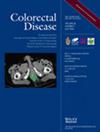Diagnostic accuracy of quantitative faecal immunochemical test in symptomatic patients for the investigation of colorectal cancer once accounting for anaemia severity and iron deficiency
Abstract
Aim
The aim of this study was to determine the diagnostic accuracy of the faecal immunochemical test (FIT) for colorectal cancer (CRC) in symptomatic patients with different levels of anaemia severity or the presence of iron deficiency.
Method
Symptomatic patients (2018–2021) from primary care were followed up prospectively for CRC for 2 years. The positive predictive values (PPV) for CRC of FIT subgroups were compared between anaemia severity groups and iron deficiency groups once stratified for symptom type and demographics. The diagnostic accuracy of FIT for CRC was investigated for different definitions of iron deficiency anaemia (IDA).
Results
A total of 17 538 symptomatic patients were investigated, including 310 with CRC (1.8%). In FIT < 100 μg haemoglobin (Hb)/g subgroups, the PPV for CRC was unchanged between anaemia severity levels (p > 0.05). In groups with FIT < 100 μg Hb/g, the PPV for CRC was unchanged in the presence of IDA, non-iron-deficiency anaemia and iron deficiency without anaemia (p > 0.05). In the anaemia and IDA subgroups investigated, FIT 10–19 μg Hb/g had a PPV of <3% for CRC and increasing the FIT cut-off to 20 μg Hb/g could have hypothetically saved 28.6% of colonoscopies. Including transferrin saturation in the definition of IDA increased the detection of CRC in FIT-negative patients (sensitivity 9.1% vs. 3.9%) but with a low CRC pick-up rate (PPV = 0.6%; 165 colonoscopies per CRC). Investigating FIT-negative functional IDA would increase the detection of CRC by 1.3% but with a PPV of 0.5%.
Conclusion
The diagnostic accuracy of FIT is excellent regardless of the severity of anaemia, iron deficiency, symptom type or demographics. The FIT cut-off can be increased safely to 20 μg Hb/g irrespective of anaemia severity or iron deficiency. Altering the definition of IDA does not pragmatically increase the detection of CRC in negative/low FIT patients.

 求助内容:
求助内容: 应助结果提醒方式:
应助结果提醒方式:


